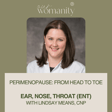
14. HPV and “Pap Smears” with Dr. Kimberly S. Gecsi
HPV, or Human Papillomavirus, is a group of more than 200 related viruses. Some types of HPV can cause health problems like genital warts and cancers, while others do not cause any symptoms and go away on their own. Dr. Kimberly S. Gecsi joins me in this episode to discuss key points about HPV including; Transmission, Types of HPV, Symptoms, Prevention, Testing and Treatment.
Kimberly S. Gecsi, MD is Chief Medical Officer, Froedtert & MCW Specialty Practice and Professor and Vice Chair of Clinical Operations in the Department of Obstetrics and Gynecology. Clinically she focuses on minimally invasive gynecologic surgery and lower genital tract disease. She has worked on national guideline development for the CDC, ACOG and ASCCP. She is active nationally in several organizations including being a member of the SASGOG Board of Directors, an ABOG board examiner, and on the GYN clinical consensus committee for ACOG. Her current research is focused on improving screening and resources for victims of intimate partner violence.
Featured in this episode:
- How common is HPV?
- Difference between HPV screening and pap smear
- Is the HPV vaccine effective?
- Alternative HPV and papsmear screening
- Do women over the age of 65 still need screenings?
Follow us on social media:
- Instagram: @drrpope
- TikTok: @vulvadoctor
- Twitter: @drrpope
Want more from Our Womanity?
If you enjoyed this episode of Our Womanity, please subscribe, rate, and leave a review. Your feedback helps us continue to bring you engaging and empowering content.
Looking for practical advice for women in their 60’s who want to become sexually active or want to improve their current sex life? Check out Sex in Your Sixties: Who says the fun has to stop? Written by a multidisciplinary group of health professionals who address issues such as pain with sex, low desire for sex, orgasm difficulties, your bladder and sex, same sex partners, vulvar skin conditions, trauma and more.



















